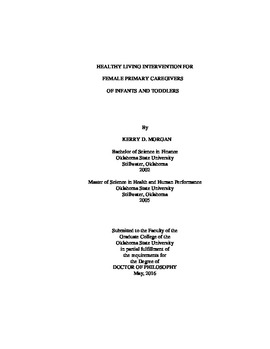| dc.contributor.advisor | Croff, Julie May | |
| dc.contributor.author | Morgan, Kerry D. | |
| dc.date.accessioned | 2017-02-22T22:10:14Z | |
| dc.date.available | 2017-02-22T22:10:14Z | |
| dc.date.issued | 2016-05 | |
| dc.identifier.uri | https://hdl.handle.net/11244/48851 | |
| dc.description.abstract | Background: Obesity has emerged as a significant health issue among both adults and youth in the United States. Nationally, 1 in 12 children aged 2-5 years are obese. Common recommendations to counter obesity in children include dietary modifications, increased physical activity, and decreased sedentary time, including screen time. One avenue to influence these behavioral targets in infant and toddler children may be to influence parent behavior. | |
| dc.description.abstract | Objective: The principal aim of the present study was to determine the effects of a Healthy Living intervention on female primary caregivers' fruit and vegetable consumption, sugar-sweetened beverage consumption, physical activity level, and television viewing time. The effects of the intervention on self-efficacy and anthropometric outcomes were also examined. | |
| dc.description.abstract | Methods: A quantitative, quasi-experimental, pretest/posttest, attention-placebo comparison design was used to evaluate intervention effectiveness. The Healthy Living treatment condition was compared to an early childhood education attention-placebo comparison condition. The Transtheoretical Model (TTM) served as the guiding framework for Healthy Living intervention development and implementation. Community lay advisors recruited participants and also delivered the treatment and attention-placebo comparison conditions. A total of 82 female primary caregivers were recruited for participation; 58 completed both the pretest and posttest assessment (26 were in the treatment condition and 32 were in the attention-placebo comparison condition). | |
| dc.description.abstract | Results: There were no statistically significant between-group differences for any of the behavioral outcomes, self-efficacy, or anthropometric outcomes. Regardless of condition, female primary caregivers' mean sugar-sweetened beverage calorie consumption, F(1, 53) = 6.62, p = .01, and mean body mass index, F(1, 43) = 4.06, p = .05, decreased significantly form pretest to posttest. | |
| dc.description.abstract | Discussion: Although this investigation suggests the Healthy Living treatment condition was no more effective than the attention-placebo comparison condition, findings do support the utility of the community lay advisor approach in recruiting and retaining hard-to-reach participants. This approach may also enhance participant self-efficacy; however, additional research is needed to examine this relationship. | |
| dc.format | application/pdf | |
| dc.language | en_US | |
| dc.rights | Copyright is held by the author who has granted the Oklahoma State University Library the non-exclusive right to share this material in its institutional repository. Contact Digital Library Services at lib-dls@okstate.edu or 405-744-9161 for the permission policy on the use, reproduction or distribution of this material. | |
| dc.title | Healthy living intervention for female primary caregivers of infants and toddlers | |
| dc.contributor.committeeMember | McGaha-Garnett, Valerie | |
| dc.contributor.committeeMember | Wheeler, Denna L. | |
| dc.contributor.committeeMember | Betts, Nancy M. | |
| dc.contributor.committeeMember | Miller, Bridget M. | |
| osu.filename | Morgan_okstate_0664D_14626.pdf | |
| osu.accesstype | Open Access | |
| dc.type.genre | Dissertation | |
| dc.type.material | Text | |
| thesis.degree.discipline | Health, Leisure and Human Performance | |
| thesis.degree.grantor | Oklahoma State University | |
